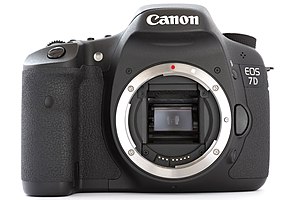Canon EOS 7D
 |
|
| Overview | |
|---|---|
| Type | Digital single-lens reflex camera |
| Lens | |
| Lens | Interchangeable (EF, EF-S) |
| Sensor/Medium | |
| Sensor | 22.3 × 14.9 mm CMOS |
| Maximum resolution | 5,184 × 3,456 (17.9 recorded megapixels) |
| ASA/ISO range | 100–6400 (expansion up to 12,800) |
| Storage | CompactFlash (CF) (Type I or Type II) |
| Focusing | |
| Focus modes | One-shot, AI Servo, AI-Focus, Manual |
| Focus areas | 19 cross-type AF points |
| Exposure/Metering | |
| Exposure modes | Full auto, programmed, shutter priority, aperture priority, manual |
| Exposure metering | TTL, full aperture, 63 zones |
| Metering modes | Evaluative, Partial, Spot, C/Wgt Average |
| Shutter | |
| Shutter | Electronic focal-plane |
| Shutter speed range |
30 to 1/8000 s Bulb |
| Continuous shooting | up to 8.0 frame/s. |
| Viewfinder | |
| Viewfinder | Optical pentaprism with 1.0x magnification and 100% coverage and electronic (Live View) |
| General | |
| Rear LCD monitor | 3.0 inches (76 mm), 640×480 (921,600 dots) |
| Battery | Li-Ion LP-E6 Rechargeable (1800mAh) |
| Optional battery packs | BG-E7 grip allows use of 6 AA cells, a single LP-E6 or two LP-E6 batteries |
| Weight | 820 g (body only) |
| List price | $1699.00 |
| Made in | Japan |
30 to 1/8000 s
The Canon EOS 7D is a semi-professionalcropped sensor digital single-lens reflex camera made by Canon. It was announced on 1 September 2009 with a suggested retail price of US$1,699. Among its features are an 18.0 effective megapixel CMOS sensor, HD video recording, its 8.0 frames per second continuous shooting, new viewfinder which offers 1.0X magnification and 100% coverage, 19-point auto-focus system, movie mode, and built-in Speedlite transmitter.
The 7D remained in Canon's model lineup without replacement for slightly more than five years—the longest product cycle for any EOS digital camera. Its successor was the Canon EOS 7D Mark II, announced on 15 September 2014.
The 7D has 19 autofocus points arranged in a horizontal diamond pattern. The AF system is a new design which uses a translucent LCD display in the viewfinder. The camera uses TTL 63 zone color sensitive metering system with four variations (evaluative, center-weighted, partial, spot) and exposure compensation of −5 EV to +5 EV in steps of 1/3 EV (±3 EV visible in the viewfinder and top screen, ±5 EV visible on the back screen). E-TTL II flash metering is provided. The translucent LCD can also display guide lines and the spot metering area circle. As with most other video-capable DSLRs, the Canon EOS 7D’s autofocusing function does not work while recording video. Instead, users can only trigger a contrast-detect AF cycle before recording process by hitting the AF button on the camera's rear panel. Users can manually focus the lens during a recording.
The shutter is rated to 150,000 shots, and is capable of speeds up to 1/8000 sec, with a flash sync speed of 1/250 sec.
The 7D has roughly the same dimension as the older 5D Mark II with an updated button layout. It also features a 100% viewfinder with 1x magnification.
...
Wikipedia
